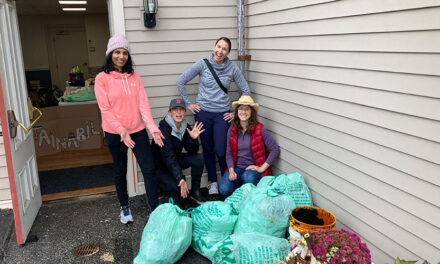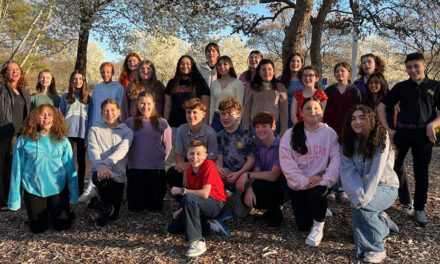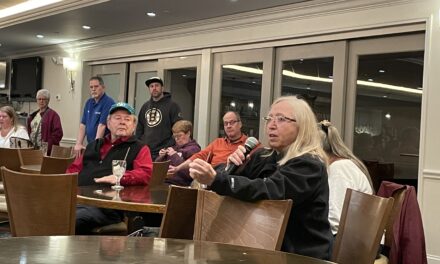Published in the August 23, 2018 edition
By MAUREEN DOHERTY
NORTH READING — Some call it hype. Others feel justifiably concerned. Only one thing is certain after Monday night’s Selectmen’s meeting: No one really knows whether the gummie candy products containing the chemical CBD (cannabidiol), a non-psychoactive cousin of THC – the active ingredient in marijuana – will harm the children it is being marketed toward.
Late last week, after bags of the candy showed up on the shelves of local convenience stores, the North Reading Police Department and Community Impact Team issued a parent advisory to let it be known these products are legally available for purchase by anyone of any age and they are not distinguishable from regular gummie candies that do not contain CBD.
One major difference is the price. A 20-oz CBD “party pack” is retailing for $34.99 while a smaller pack of Hemp Bombs CBD was selling for $8.99, both of which may be out of reach for most youths.
Amy Luckiewicz, the town’s substance abuse grant coordinator, told the board it is important to note that these products are “100 percent legal … nothing we do or say will change that.”
However, she is also obligated in her role as the substance abuse grant coordinator who works primarily with the town’s children to provide information to parents and children about such products which have flooded the market “before the testing phase was in place” at the state level.
Therefore, the CIT and NRPD “field tested” both of these gummy products and discovered that both “tested positive for THC” even though the label clearly states the product “does not contain THC,” she said. A third, small product called a Froggie did not contain any THC in their field test.
The problem with the field testing is that since no standards exist they do not know what level of THC would be considered to be a concern for children, especially toddlers, she said, adding the labeling is very inconsistent and they could not clearly determine what constituted a “serving size.”
Police Chief Mike Murphy said, “There is no test at this point to determine how much is in there.”
The retailer they spoke to expressed concern that his distributor told them the products did not contain THC.
Selectman Andrew Schultz concurred that the parent alert is merely for informational purposes. “We are not trying to ban it,” he said. Noting that one of the products that tested positive for THC did not have an ingredient list on it, he asked, “Who would buy food from a store without an ingredient list?” Since the product is regulated by the Department of Agriculture, an ingredient list is not required. By contrast, a regular candy package of gummie bears, for instance, would require an ingredient list.
One parent, Heather Laverdiere, who serves as co-president of the NRMS Parents’ Association, commented that this is being added into the mix at a time when parents currently face “enough problems” with young kids “vaping and Juuling.” She welcomed the educational advisory, but admits that parents are currently at a loss as to what to tell their children about such products. “These kids are naive.. I am honest with my kids… a lot of parents are afraid to tell their kids what’s going on,” she said.
“It starts here to create awareness,” Selectmen Chairman Mike Prisco said, “The town has invested in these departments to give parents answers to questions and if they do not have answers, they will look into it.”
Selectwoman Kathryn Manupelli noted that any future discussions should involve the business community too, noting that there is no age limit to purchase these products. “I get carded when I buy cough medicine and when I drink,” she said, adding, “I do think it is untested territory…What is clear is (the manufacturers) are misrepresenting that it does not have THC.”
The Parent Alert on CBD products posted on the NRPD website states the following:
The Cannabis sativa plant contains more than 100 different chemical compounds called cannabinoids.
Researchers are working to examine the benefits and risks associated with these chemicals. One such chemical is CBD (cannabidiol). It is non-psychoactive unlike THC, the active ingredient in marijuana. In Massachusetts, CBD products are generally treated as a hemp product, a cousin of the higher THC concentrated Cannabis sativa plant. As a hemp product, it is regulated under the Massachusetts Department of Agriculture. It is not illegal to possess CBD product in Massachusetts.
Areas of Concern
• CBD products are commonly marketed as candy, mostly gummy products, and are very attractive to children. Most are indistinguishable from well-known candy products.
• CBD products are available through online market places and group discounts. They are available in retail stores in North Reading.
• In Massachusetts, CBD products may contain up to 0.3% THC.
• Currently, there is no testing nor regulation process in place to determine levels of THC or other ingredients in the product.
• Concentrations of CBD in products can be inconsistent and often not listed on a label.
• Since CBD is treated as a hemp product, there are no science-based recommendations for serving/dose sizes. Dosing considerations include many factors
• CBD is a Schedule I drug under the Controlled Substance Act, and is federally prohibited.
Frequently Asked Questions
What is the connection between CBD and marijuana? Derived from the same plant, Cannabis sativa, in MA, CBD products may contain up to 0.3% THC, which is a psychoactive product. Marijuana can contain much more THC.
What are CBD products? CBD can be found in a range of products including candy (mostly gummy products), oils, liquid “shots,” and lotions.
Are there health benefits to CBD products? People have reported health benefits including easing arthritis, epilepsy, and extreme pain. However, there is a lack of long-term use and adolescent use studies related to CBD product use.
If it can have health benefits, is it regulated by the FDA? The FDA has approved only 1 medication containing CBD which is used to treat two rare forms of epilepsy. All other products are untested or unapproved by the FDA.
What to do if I suspect my child has ingested CBD? Since CBD may contain up to 0.3% THC, it can have a negative health affect on children, especially if you don’t know how much of the product was ingested. Immediately take your child to a medical facility. Concentrations vary and can affect youth with varied physical consequences.
How can I learn more? The vast majority of online information is produced by pro-CBD and/or pro-marijuana companies. Scrutinize your sources and be sure to examine any financial ties to such resources. Consult your child’s doctor if considering giving a CBD product to a minor.




